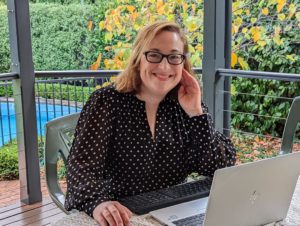Introduce yourself and your role with the Taskforce/Consumer Panel.
Hi, I’m Annie Synnot and I’m based in Adelaide. I’m a researcher interested in evidence synthesis methods, in particular the methods for involving consumers (i.e. patients and the public) in the development of systematic reviews and guidelines.
 Describe your education & career pathway to the Taskforce.
Describe your education & career pathway to the Taskforce.
I’ve just completed my PhD at La Trobe University. Prior to that I did a Master of Public Health and originally trained as a physiotherapist. I was with the Cochrane Consumers and Communication Group at La Trobe University for many years where I learnt the foundations of systematic reviewing and worked in partnership with consumers, health professionals and policymakers on a number of research projects. During that time, I also worked with Cochrane Australia developing the methods for living systematic reviews, and led the pilot of living systematic reviews within Cochrane.
What part of your role do you enjoy the most?
I can’t believe I am saying this, but writing papers! It’s a skill I honed during my PhD and it has gone from being a dreaded task to something I really enjoy. I love cracking the nut of how to set up the paper and watching it come together as I complete each section in turn.
Name one key learning in your time with the Taskforce.
The nuts and bolts of guideline production and what it looks like to involve consumers in guidelines. Before that I had researched what best practice could look like but had not actually done it. It’s been so rewarding to test out what I learnt and see it actually work.
Why does the consumer lens interest you?
It appeals to my sense of social justice. The health system, including health research, has been and still is, in many ways, patriarchal. Power resides with the professionals. I think it makes complete sense to everyone that patients should be at the centre of the health system but it’s been a gradual shift. Also, as a researcher, no-one will keep you honest like a consumer partner and my research is fundamentally better as a result of their input.
How do you unwind after a week of work?
A typical weekend for me involves playdates and playgrounds and very little unwinding. Ideally it would involve more good food and wine, movies, hikes and weekends away. Hopefully soon!
What is the hardest thing you’ve done in your career?
Working on my first ‘proper’ research project, in which we encountered a number of curveballs and challenges that seemed, at first, ‘unsolvable’ and caused me a lot of worry. I learnt that there are always workarounds, even when you can’t see them at first, which has been such a great lesson, as these things happen in research, and life, all the time.
What does your dream career milestone look like?
I’d love to get a major grant to allow me to explore my research interests unimpeded for a year. And maybe work overseas for a while, too.